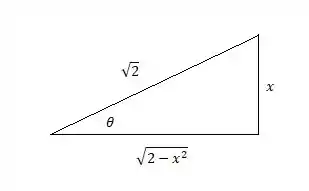Calcule a integral indefinida:
Passo 1
Para resolver essa integral vamos fazer uma substituição trigonométrica, temos que a expressão é da forma , nesse formato de expressão vamos fazer e utilizar a identidade trigonométrica :
Substituindo temos:
Agora usando a identidade trigonométrica:
Passo 2
Agora vamos usar outra identidade trigonométrica:
Assim ficamos com:
Passo 3
Pronto, com a primeira integral é fácil achar as primitivas da função, usando a expressão da Tabela de Integrais Indefinidas:
Agora é só aplicar:
Com a segunda vamos fazer uma substituição:
Substituindo:
Agora usando a expressão da Tabela de Integrais Indefinidas:
E agora plicando:
Passo 4
Agora é só juntar tudo:
Calma, não terminou ainda, não esqueça de voltar para a variável , é só substituir de volta o que você usou no começo:
Temos que , assim vamos usar o triângulo retângulo abaixo para achar :

Assim o valor de :
Substituindo isso ficamos com: